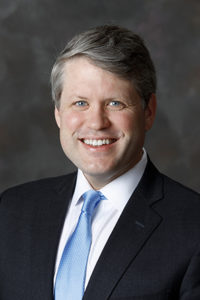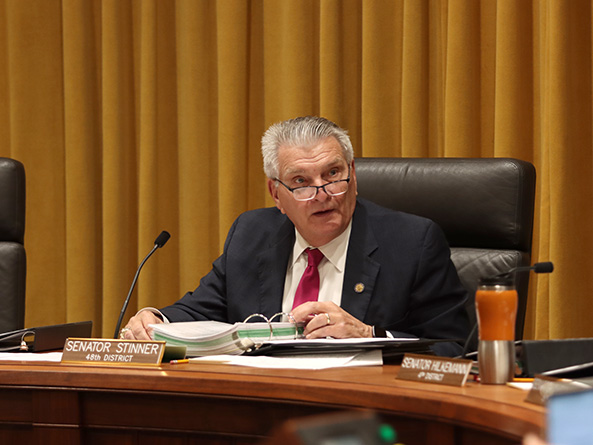Budget adjustments offered
Mid-biennium adjustments to the state’s budget were considered by the Appropriations Committee Jan. 24. The state budget is structured on a two-year basis, with the budget passed in odd-numbered years and adjustments made during legislative sessions held in even-numbered years.

Three bills, introduced by Speaker Mike Hilgers of Lincoln at the request of Gov. Pete Ricketts, comprise the governor’s mid-biennium budget recommendations:
LB1011, which would provide, change and eliminate state appropriations;
LB1012, which would transfer funds, create funds and change and eliminate provisions regarding a fund and reimbursement provisions; and
LB1013, which would change provisions relating to the state’s Cash Reserve Fund.
Presented to the committee by State Budget Administrator Lee Will, the bills would make adjustments in the current fiscal year ending June 30, 2022, as well as the next fiscal year. Lee said that since the biennium budget package was passed last year, the state has collected over $400 million more in general fund tax receipts than was forecast.
The governor’s budget recommendation in LB1011 includes a general fund reappropriation increase of $75.3 million to the state Department of Health and Human Services and the following transfers from the General Fund:
• $5 million to the Governor’s Emergency Cash Fund;
• $40.7 million to the Nebraska Capital Construction Fund; and
• $150 million to the Statewide Tourism and Recreational Water Access and Resource Sustainability Fund, known as STAR WARS.
LB1012 would create several cash funds and transfer $500,000 on April 30, 2022, and $1 million on July 1, 2022, from the General Fund to the Community College State Dependents Fund.
LB1013 contains transfers from the state’s Cash Reserve Fund of $400 million to the Perkins County Canal Project Fund, $175 million to the Nebraska Capital Construction Fund — including $155 million for the replacement of the Nebraska State Penitentiary facility — and $20 million to finance mental health beds within the correctional system.
The budget adjustments are based, Will said, on a projected 3.5 percent annual growth rate. He said the governor’s recommendations would provide a general fund balance at the end of the current biennium of $349 million and a cash reserve balance of $941.2 million.
Speaking in favor of the proposal, Jalene Carpenter, president and CEO of the Nebraska Health Care Association, said the additional funding included for a temporary provider rate increase would help the “dire” situation facing facilities. She urged lawmakers to take additional steps, however.
“We appreciate the 2 percent proposed increase to the current provider rate in the biennium,” Carpenter said. “But I have to tell you, it is not sufficient to address the crisis happening in our skilled nursing facilities today.”
Carpenter said that 55 percent of skilled nursing facility residents in Nebraska are Medicaid recipients, and the reimbursement rate for those residents is less than the cost of their care. As a result, she said, facilities lack the resources to recruit and retain employees in the state’s tight labor market.
Four skilled nursing facilities closed last year, Carpenter said, and another announced last week that it also will soon close its doors.
“We do not have staff,” she said. “We cannot compete.”
Also testifying in support was Alana Schriver, executive director of the Nebraska Association of Service Providers. The organization, which advocates on behalf of developmental disability providers, supports the temporary 15 percent rate increase included in the budget proposal, she said, but believes that it doesn’t go far enough.
“Such investments are the minimum necessary for Nebraska to build back a sustainable home and community-based services infrastructure that can address the magnitude of unmet needs in our communities,” Schriver said. “A temporary rate increase only offers a temporary fix.”
Craig Beck, speaking on behalf of OpenSky Policy Institute, testified in opposition to the budget proposal. He said the assumed 3.5 percent growth rate on which the proposal is based is “too optimistic” and relies too heavily on transfers from the state’s cash reserve and one-time federal pandemic relief funds.
“A robust cash reserve is needed to weather future economic downturns,” Beck said.
Also testifying in opposition was Danielle Conrad of the ACLU of Nebraska. Calling the proposal “misguided” and focused on “prisons, politics and pet projects,” she said the state would be better served by a focusing more on individuals who have been most deeply impacted by the pandemic.
“What the governor’s proposal is light on is people, is equity, is ensuring that we are utilizing these historic opportunities to make a positive difference to move our state forward,” Conrad said.
The committee took no immediate action on the budget proposal.


